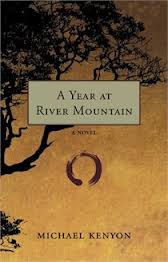A Year at River Mountain
by Michael Kenyon
Thistledown Press, 271 pages, $19.95.
Reviewed by Judy LeBlanc
The diary form in fiction invites us into the deepest chambers of the human psyche, a terrain to which I am drawn. However, it is not a form preferred by writers for good reason; it takes a compelling narrator to hold you that up close and personal for the length of a book. Cloister that narrator in a spiritual context in a faraway country and before I turn the first page, I am excited about the premise and what most certainly will be a serious grapple with metaphysical questions, insight into the human condition, a sprinkling of ah-ha moments.
In A Year at River Mountain seasoned author, Michael Kenyon (five novels, three books of poetry) takes the reader into the world of an aging actor turned monk from Vancouver who has spent the past twelve years sequestered in a monastery in China. A visit from an actress the year before and her anticipated return forms the skeletal backdrop of the narrative. The beguiling actress named Imogen-of Shakespearean allusion-serves as a ghostly representation of the life from which he has fled and drives the narrator into musings on desire, his childhood and failed marriage, an estranged son. Kenyon strikes a tone of melancholy and timelessness as he describes the changing seasons and the monastic routines: sweeping leaves from the path to the temple, laying out nests, meditation. Nature is imbued with the narrator’s emotions: “Like the weather with its succession of storms, each ripping then drenching the forest, stirring the river into a brown, hissing snake wider every day, I am unsettled.” A sense of disturbance to the old order is heightened by the eruption of images, stark and vividly drawn: a vulture perched on the body of a drowned child as he drifts down the river, a bear nosing the old master’s corpse, a rape scene. A threat of violence lurks just beyond the monastery where unrest in the village culminates in war.
Though the seasons provide a gauge for the passage of time, the plot is more kaleidoscopic than linear. Brief and often disparate episodes drive the story forward and contribute to the character’s increasing feeling of dislocation. It is unfortunate that Kenyon didn’t allow his talent for evocative imagery to carry the weight of the story. An excess of sentence fragments evince poetic pretension. Rhetorical questions are left to hang like so many hollow pieces of laundry. Too many cryptic assertions trip me out of what might otherwise be an absorbing panorama of this man’s psychic struggle. The narrator describes his own commentary: “The massive abstractions and universalities and anonymous figures arrive anyway . . .” It is as if the author, himself, is aware of his inclination to strain toward profundity, and in the end, to fail to deliver.
This book promised a journey through a challenging terrain with the reward of a wider view. Instead, I am left with the feeling that I have scrambled through underbrush and arrived not far enough from my point of departure.
Judy LeBlanc is a fiction writer and a recent grad of UVIC’s MFA program.
